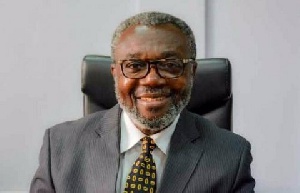Ghana has taken delivery of 400,000 doses of the world’s first ever malaria vaccine for the immunisation of children between the ages of six months and two years.
The RTS,S /ASOI malaria vaccine, expected to serve as an additional tool for the elimination of malaria in the country will be rolled out under the malaria vaccine implementation programme (MVIP) come May 1, 2019.
Children in 33 districts in six selected regions across the country will benefit from the four-dose course vaccine designed to stimulate one’s own immune system to defend malaria.
The exercise would last a period of two to three years after which it would be scaled up countrywide depending on its success.
Director-General of the Ghana Health Service (GHS), Dr Anthony Nsiah-Asare, briefing journalists on the MVIP in Accra yesterday noted that the country had requisite capacity to receive more vaccines as well as stick to an efficient supply chain cycle to ensure injections reached all implementing agents in time.
“We have assessed and ensured adequate capacity of the country’s cold chain and injection waste management as part of a number of preparatory activities by the Ministry of Health and its partners to ensure safe introduction of the MVIP.
It is important to highlight that all districts, implementing and non-implementing, will receive full packages of other malaria control interventions,” he stated.
Dr Nsiah-Asare mentioned that routine monitoring of the safety profile of the RTS,S would be done as well as maintain effective communication strategy, staff training and thorough stakeholders’ engagements to promote smooth implementation of the MVIP.
He called for the cooperation of all stakeholders, encouraging parents to bring out their children for immunisation when the programme commences indicating that Ghana had made strides in reducing incidence of diseases like measles, polio among others through immunisation.
“This like any other vaccination is free-of-charge and parents are not expected to pay anything for it. Government and its agencies has taken the cost therefore if anyone tries to demand any charge for this vaccination, do not hesitate to draw the service’s attention,” he directed.
Director of Public Health of the GHS, Dr Badu Sarkodie in giving an overview of the programme explained the piloting of the vaccine was to assess “feasibility, safety and impact of the injection in the context of routine use alongside other currently recommended malaria control measures”.
He said, between 120 and 150 children were targeted for immunisation with “at least 50,000 malaria cases expected to be averted and approximately 750 children anticipated to be saved from dying in the intervention areas.”
Ghana in 2017, received approval from the World Health Organisation (WHO) alongside two other African countries; Kenya and Malawi to implement the world’s first ever malaria vaccine.
It followed a national response in 2016 to the WHO’s call on the various ministries of health worldwide to express interest in collaborating in the MVIP leading to a clinical trial of the vaccine in two research centres in the country; Agogo and Kintampo in the Ashanti and Bono regions respectively.
Available statistics show that four per cent of the world’s total malaria cases in 2017 were from Ghana and was among the top 20 countries with the disease prevalence in the same year globally.
Of the nearly 600,000 annual deaths caused by malaria across the globe, about 90 per cent of the cases are in sub-Saharan Africa with 83 per cent of the figure being children under the age of five.
Malaria is a life-threatening disease caused by parasites transmitted through the bite of an infective female anopheles mosquito.
Its symptoms may include fever, headaches, a sensation of cold with shivering, vomiting, high temperature among others.
General News of Friday, 12 April 2019
Source: ghanaiantimes.com.gh













